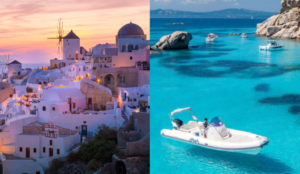Turkey and Greece are the two transit countries for migrants on their way to Germany and other richer countries in Northern Europe. Immigrants are very resistant. Many of them have survived poverty and conflict but have nowhere to go.
The international system for managing migrants has broken down. Front-line countries facing migratory flows, such as Turkey and Greece, are overburdened beyond their means of accepting migrants and other refugees.
If developed countries cannot respond more effectively, migrants will continue to remain in a precarious position, victims of a dysfunctional system that lacks the capacity and political will to help them.
Turkey hosts more migrants and refugees than any other country in the world. Over 3.5 million people from countries like Syria, Afghanistan, Iraq and Iran. In 2016, Turkey and the European Union reached an agreement to control the flow of migrants from Turkey to Greece.
Brussels offered Ankara a single payment of 6 billion euros to offset Turkey’s financial costs in holding these migrants, mostly Syrians. At the time it seemed like an incredibly large amount. But the problem went on for much longer.
It is hard to sympathize with Turkish President Recep Tayyip Erdogan, whose support for jihadists in Syria exacerbated the refugee crisis. He expected the regime of Bashar Al-Assad in Syria to fall quickly, and the displaced due to violence to return to their homes.
Erdogan did not expect so many Syrians to stay so long in Turkey, and now he wants to solve this problem as soon as possible. Immigrants are useful to Erdogan, only to the extent that they can be used as a political weapon to get as much money as possible from the European Union.
He has repeatedly threatened Brussels that it will “open the gates” to at least 1 million migrants if Turkey does not receive further financial support from Brussels. And finally on February 27, 2021, he announced that Turkey would no longer stop migrants crossing its borders to go to Europe.
He also announced plans to relocate 1 million Arab Syrians from southern Turkey to Kurdish territories in northern Syria. Former US President Donald Trump gave Erdogan the green light to establish a “security zone” in Syria along the border with Turkey.
European officials also complied with Erdogan’s demands, providing additional funding to manage the problem. However, the immigrant crisis only got worse. Rising social tensions in Hatay province and cities in southern Turkey are making migrants feel unwanted.
Their living conditions are dire. Immigrants face difficulties in obtaining work permits. Access to housing and social services, such as health care and education, are increasingly limited.
Many immigrants were employed in black in restaurants, cafes, construction and tailoring. With the Turkish economy hit hard by the Covid-19 pandemic, these jobs, even information, have disappeared. Many Syrian immigrants are giving up their temporary protection cards and returning to Idlib.
Immigrants face a difficult choice. They can either return to their countries of origin devastated by war and poverty. Or stay in Turkey where they are unwanted. Or take the perilous journey to Greece.
Those who do so encounter many obstacles as they travel north through the Balkan corridor. In 2016, German Chancellor Angela Merkel was visionary and practical, welcoming nearly 1 million immigrants to Germany, and integrating them into the German economy and society.
But Merkel takes office in September; while Europe has no leadership on the issue of migrants. Politicians fear that a softer immigration policy would serve as a “magnet” for the arrival of many immigrants, further overloading the system and plunging domestic politics into chaos.
Greek Prime Minister Kyriakos Mitsotakis is rightly concerned when he says that Greece is becoming a “repository” for refugees. Instead of taking responsibility for fixing the broken EU migration management system, EU officials are content for Greece to be a shield protecting Europe from a large influx of migrants.
They speak cynically of “European values” while turning a blind eye to illegal border control practices, collective deportations and illegal returns. The European Union is not ready to fix a broken immigration system, at the expense of migrants who are desperately seeking help and protection.
Immigrants are being seen as a burden. They are unwanted, even though many of them have skills, and can be productive members of society. The EU urgently needs an effective system to maximize the contribution of migrants to European societies.
Ultimately, the best way to manage the migrant crisis is to address the root causes of this phenomenon. This will require transatlantic efforts to prevent conflicts, and to create developmental conditions that will discourage people from leaving their homes. / Translated by: Alket Goce-abcnews.al
Note: David L. Phillips, is director of the Peacebuilding and Rights Building Program at the Institute for the Study of Human Rights at Columbia University, USA. He has served as an adviser and foreign affairs expert at the State Department during the Clinton, Bush and Obama administrations.




